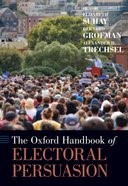Electoral persuasion rests at the center of the democratic process. Politicians, parties, interest groups, members of the media, and citizens themselves are constantly communicating with one another about electorally relevant topics. These communications will ultimately influence—although not always in predictable ways—voters’ choices and, therefore, election outcomes and the direction of government. Scholarship on this important topic has exploded in recent decades. Yet, there have been relatively few efforts to synthesize the accumulated knowledge. In this volume, we bring together accomplished scholars who study one or more aspect of electoral persuasion—who communicates with whom about democratic politics, what they communicate about and why, how and where they communicate, and with what effect. The result is a vibrant collection of US-based and international perspectives on the relevant actors, their motivations and methods of persuasion, and their varied influences on electoral choice.

The Oxford Handbook of Electoral Persuasion
Editorial: Oxford University Press
Año publicación: 2019
Autor: Edited by Elizabeth Suhay, Bernard Grofman, and Alexander H. Trechs

